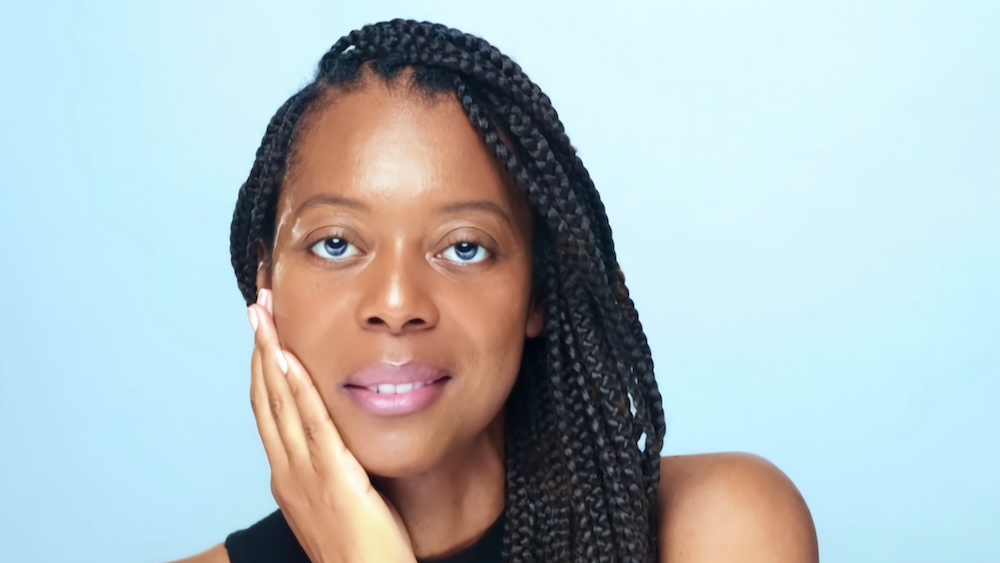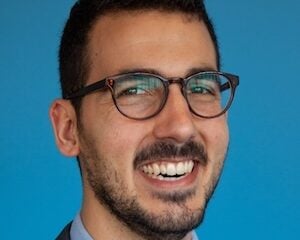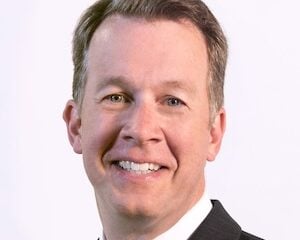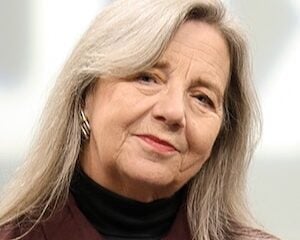How AIR’s Keisha Salmon plans to leverage mentorships and advocacy to diversify pubmedia’s audio talent pool

Salmon
Throughout her career, Keisha Salmon has been drawn to helping people.
During a recent interview with Current, Salmon described how she’s developed communications strategies to help entrepreneurs and organizations such as American Documentary — and how she hopes to continue that work in her new job as executive director of the Association of Independents in Radio.
“When I heard about the opportunity, it really just matched where I’ve been wanting to go,” Salmon told Current.
Salmon took over as executive director of AIR last month. In her previous role in public media she led communications strategy for American Documentary and POV, its PBS series showcasing independent films.
Salmon is the first Black woman to lead AIR as executive director. She succeeds Ken Ikeda, who resigned last year. After accepting the job, she realized she’d become one of only a few Black women to lead a public media organization. “It’s eye-popping,” Salmon said.
Efforts to bring more diversity to public media are moving slowly, she added, “but it is happening,” she said. “I want us to think more intentionally. We’re talking about diversity for creators, but we also need to talk diversity for leadership.”
Salmon spoke to Current about her priorities at AIR, how she hopes to build more financial support for AIR’s training initiatives and the importance of mentorship for the organization’s membership.
The following interview was edited for length and to include additional details about AIR’s membership demographics, mentorship programs and advocacy goals.
Tyler Falk, Current: Why did you want this job?
Keisha Salmon: There’s this thing that I have where I want to help the individual person. It started years ago when it came to entrepreneurship and helping small business-owners and entrepreneurs. I had started a Facebook group called a Small Business Advisory, just helping people get over humps that could be avoided if we just had a community that can contribute their experiences. I’ve always been focused on that, and I’ve been making my way through my career to get to a position exactly like this. When I heard about the opportunity, it really just matched where I’ve been wanting to go. All the skills and experiences that I’ve built up [are] now going to be properly applied to an organization that meets my interests and actually has that open need for what I can contribute.
Current: What is your top priority now that you’re leading AIR?
Salmon: To continue to grow our membership and to keep it as a mission-driven membership organization, where radio will always be the most important aspect of it. We want to also get a lot more established media professionals into our community so we can have a larger conversation around what more the industry needs to keep this going.
Current: What are some ways you’re looking to grow AIR’s membership?
Salmon: We’ve been looking at where our membership is right now, demographically. We’re unbalanced. If you’re a podcaster, we’re not a podcast-only thing, but we do have a lot of resources and opportunities for podcasters. If you’re in the audio engineering space, we have programs and services that can allow you to strengthen your skills. …We have to look at … why we seem to be unbalanced in certain areas, especially when it comes to our racial equity — there’s a lot of unbalance there. We’ve got to reevaluate how we’ve been presenting ourselves externally and then target the audiences that match and need services that AIR is providing.
Current: In what ways do you see AIR’s membership as unbalanced?
Salmon: Our membership has … a high percentage of non–people of color. Our most recent member survey found that 77% of our members, at least those who contributed to the study, identify as white. We know we have work to do to engage more communities of color.
There’s something missing that creators of color don’t see AIR or haven’t been able to see the value in AIR enough to join. We have to make sure that they do. There are a lot of programs, resources that AIR provides that specifically target creators of color and can really help advance their position in the audio or podcasting space.
Current: Is the membership more weighted toward radio than podcasting?
Salmon: The unbalance is mostly on the identity. Podcast is one of the member roles that’s growing because the podcast world is a booming system that allows just about anyone to join. We’re trying to maximize that space and make sure that once you enter as a podcaster, you’re refining your skills.
Current: You mentioned messaging and expanding the demographics of the membership organization. Are there other ways that you hope to reach more people?
Salmon: There are so many partnership opportunities that we’re looking to tap into. I’m trying to get familiar with who we’ve been working with already and the potential other partners that we can reach out to. I’m excited because I’ve already gotten a lot of outreach from organizations that have not yet partnered with AIR. There could be a lot of new opportunities for us going forward.
Current: What are your long-term goals for the organization?
Salmon: We are really proud of our mentorship and training programs, and want to continue our commitment to those. We are looking for organizations like CPB and NPR to make a commitment as well and invest in these programs that are advancing the field. An idea would be for a CPB or an NPR to underwrite programs like Edit Mode. Edit Mode is … helping to diversify the audio industry editor pool, and that’s what we want.
Instead of newsrooms poaching the same editor of color, AIR’s programs expand the talent pool of BIPOC editors in the audio industry. NPR is one of the leading organizations where we’ve placed 20% of our Edit Mode graduates over the past two cohorts. Edit Mode is no longer a proof of concept; it is fully realized. … The vast majority of our 2021 and 2022 Edit Mode fellows are working editors in the industry.
It should be a collective commitment and investment in programs like that, because as I mentioned, there’s a lot of talk about diversity in the field. We have a strong program that’s putting a dent in that – really closing that gap. But it’s not supported enough by organizations that need the diversity and organizations that have the funding to help us invest in that.
Current: Why do you see mentorship as a priority and something that NPR and CPB should invest in?
Salmon: It’s important for us to bring in more established media creators and podcasters [as AIR members] so they can contribute their experiences back to emerging media creators. … There’s quick and easy ways to uplift them over some hurdles that don’t need to be there. Those hurdles will eventually disappear once we learn how to better navigate them. That’s why mentorship is important.
Two of our mentorship programs — Edit Mode and New Voices — are open to members and nonmembers. You don’t have to be a fully committed member to AIR to get these mentorship opportunities. Both are explicitly designed to support producers and storytellers from diverse backgrounds in the radio and podcast industries.
New Voices is our biggest program. New Voices has a community of 200+ alumni to reflect and engage in critical dialogue and networking opportunities. That has been quite beneficial to our members and to the industry.
Current: Are there other programs or initiatives that you’d like to tackle going forward?
Salmon: One of the things that I’ve heard from our members, board and staff is a commitment from production companies to fairness when it comes to paying freelancers. That’s one of the small commitments that could be made, but it makes a huge … dynamic change to a freelancer’s career trajectory and their livelihood. And it’s as small as changing from a net 60-day invoice payment schedule to net 30 or 15, if it’s possible. I see it as a small change for an organization, but a huge change in a positive way for freelancers. Bills and financial obligations are monthly for most people. The vast majority of freelancers are still working paycheck to paycheck.
It’s that kind of advocacy that we’re looking to really step into and get like solid commitments — and also continue to work with our research team on our rate guides. And those things are important. We want to make sure that we’re staying ahead of the rates and research. And making sure that our members have a really good understanding as to their worth and how to negotiate contracts with major organizations that they’re working with and to keep advancing fairness and equity across the industry.
Current: You are the third ED to lead AIR in four years. Do you have plans to support the staff in new or different ways?
Salmon: That’s a great question. I love a collaborative workspace. The way that AIR can support our staff members is for them to feel like they have buy-in, they are part of the big decisions that are happening and have ownership over the programs that they’re running. They are part of this membership-driven environment that we’ve created and they are going to be part of the big decisions. I’m fairly new to audio, not to the public media world, but I’m going to lean on them initially to get their thoughts on … what more we can do for our members, what’s missing? What have we been doing that we can scale back on because of the changing times? They’re going to feel that a lot of their input is being translated back into their work. Just the few conversations I’ve had with them so far, there’s so much enthusiasm and excitement. I want to keep building on that momentum.
Current: How did your experience with American Documentary and POV influence your agenda as ED of AIR?
Salmon: The one thing that I loved about POV was that POV acquired films, [which meant that] their money really went to filmmakers and creators that were going to be featured on their program. POV really wanted to support the emerging filmmakers that were coming out of school or starting to see themselves as strong filmmakers. But we didn’t have the funding in place to just buy their films. So we started creating really creative ways to support filmmakers who are just starting or have a great idea, but it’s not well polished yet. We worked with Kickstarter and the Knight Foundation. It’s those kinds of creative thought processes that I want to bring into AIR. We’re looking at working with PBS stations and trying to get them to understand how best to work with independent media makers and … other production houses on co-productions where we’re sticking to a very good, mission driven storytelling angle. There’s a lot of local news that can be enhanced with a podcaster. There’s just so much that I’ve picked up from POV that can translate really well back into AIR.
Current: What do you see as some of the biggest challenges facing independent audio producers?
Salmon: It’s still the rate card. It’s all over the place. And there needs to be some consistency so when an editor enters a room and they negotiate a contract, they have an idea of what their value is and what they should be paid. That’s what we’re trying to do. The more members that join AIR and contribute [details about] their salaries, payments or fees that they’ve received, it helps us expand our rate card and our research. And that allows us to offer our members a better way of sustaining that lifestyle. And that’s … the ongoing fight. Not too many people want to share their salary because it feels like it may minimize or add competition to their work, but it actually relieves a lot of that stress of how to negotiate for what you’re worth.





